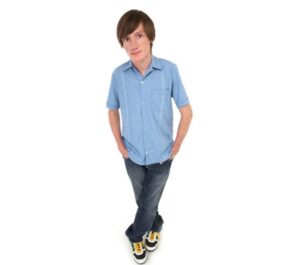
Interview with HIV/AIDS Activist Cameron Siemers
By Sherri Lewis
The following is an interview with Cameron Siemers, founder of the Cameron Siemers Foundation for Hope and lifelong HIV/AIDS activist, conducted by FAM Board Member Sherri Lewis, who has written for “The Body” and “POZ” magazines.
Sherri Lewis: Hello, Cameron. I’m so glad we didn’t lose touch, so you could tell your story for The AIDS Monument. Let’s start at the beginning. When were you diagnosed?
Cameron Siemers: I was infected through a blood transfusion when I was two years old. I was being treated at Long Beach Memorial at the time.
SL: You were so young. What do you remember from that time? Do you remember how you felt? Were you sick? How did your parents and friends react?
CS: So I actually didn’t find out I was HIV positive until I was eight years old. I remember being in the kitchen taking my disgusting medicine — DDI it was called at the time. My mother asked me if I wanted to know why I took medicine. I told her yes without hesitation. She said I have HIV, and I just told her we’d fight it and immediately hugged each other. It was actually a really nice moment. The friends I told were mostly very supportive. I remember one friend vandalized my house a little bit after he found out. It sucked. But that was the worst of it.
SL: What were your health problems?
CS: Too many to name, really. I can give you the highlights, I guess. I am hemophiliac and HIV positive. I’ve always had trouble eating and keeping weight on. When I was 24, I almost died from a massive hemorrhage from pancreatitis. I was on a ventilator for ten days. The doctors kept telling my family I wasn’t going to make it. That left me very weak for a long time. In 2016, after three long years on dialysis, I got a kidney transplant. The HIV meds and complications destroyed my organs and I needed a new one. Luckily, I had a match: my mom. I’m doing pretty well now after that ordeal.
SL: How did AIDS affect your life after that?
CS: Everything has been affected. Holding a job is hard. Dating has been extremely difficult. I have amazing friendships though, and my life experience is not only unique but has given me perspective on life I consider invaluable.
SL: How was it throughout your school years?
CS: My younger years were both tough and amazing at the same time. I played baseball ’til I was 16, despite all my health issues. I had many friends. I was also in the hospital a lot or bed-ridden due to some illnesses. But I got to do more than most. My parents were very supportive of me, always pushing me to try new things.
SL: You already spoke about your friendships. How about romantic relationships as you got older?
CS: Dating didn’t really happen for me until my mid-20s. I didn’t know how to approach living with this disease. Also looking very young for my age is hard. I weighed around 80 pounds until I was 25. Looking like you’re 12 in your 20s really doesn’t go well with the ladies. Now it’s a lot better. I look more my age. I’m a little healthier and a little more confident. And I’m open about my status. People who meet me usually know I’m HIV positive from the beginning.
SL: Were you able to work?
CS: This is a huge challenge for me and many people like me. Holding a job and dealing with all my medical issues is very hard. And dealing with my SSI Disability is extremely difficult. You’re kinda treated like a criminal, like you’re trying to cheat someone. I’m clearly not, but they don’t know the difference and the competency at that office is low.
SL: When did you create your nonprofit?
CS: I started www.cameronsiemers.org to help people like me find their purpose, and in doing so, I found mine. Growing up with a life-threatening illness is hard and has its own unique challenges that don’t just go away when you become an adult. My purpose is to help people bridge that gap.
SL: What is your life like now?
CS: I’m in a very confusing time in my life right now but also very exciting. I’m dating, which is new for me. Figuring out who I am at 41 is an interesting journey, but I can’t complain — even though I still do sometimes. (Cameron laughs at himself as he says this.) I’m optimistic. Challenges will always come and go. That’s life. It’s truly the journey not the destination. As very freaking cliché as that is, it’s true.
SL: What would you like in your future?
CS: A home and people to share it with. And to travel more — again a cliché, but that’s what I want. My purpose with my nonprofit is set, but there’s living my life that excites me now. Living not surviving. I’ve done that already.
SL: Yes, you have. You have gone beyond surviving under the most difficult of circumstances. I think of you as a hero. Your life is about thriving and beyond. Thank you, Cameron. Until we speak again.